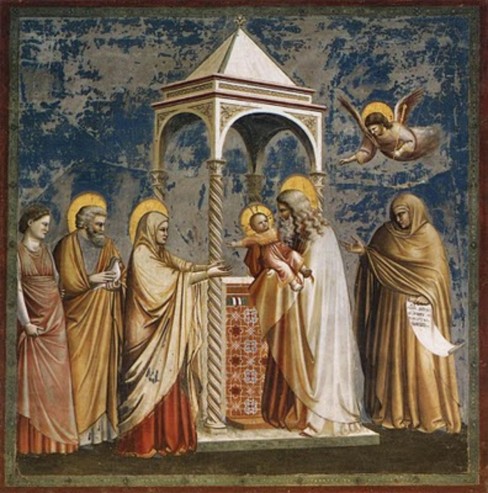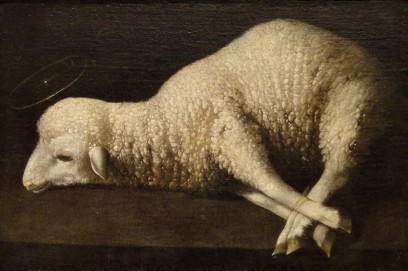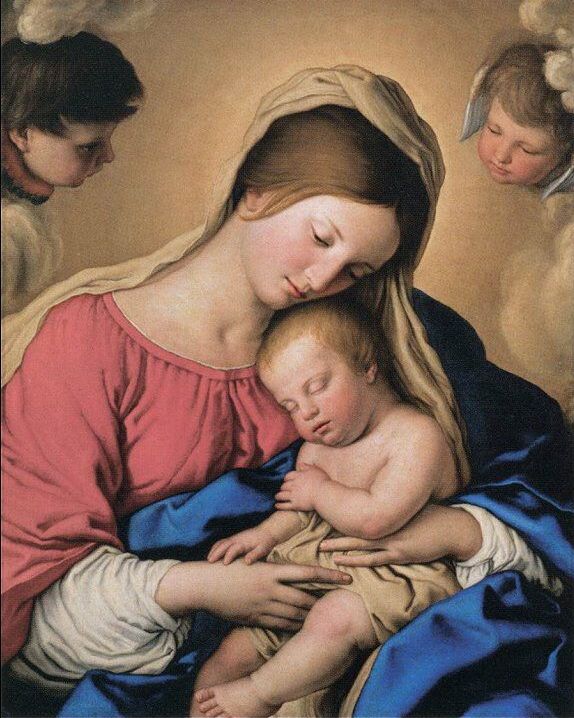No ground for boasting in the presence of God
When the holy Mother of God and Saint Joseph go to the temple for her purification and to present the Child Jesus, in accordance with the Law, they bring with them the humble offering of the poor: a pair of turtle doves. Other devout Jews, having the means to do it, would bring the preferred offering: “a lamb fit to be offered” (Leviticus 12:8). This ritual action fulfills what the Lord said to Moses: “Dedicate to me every first-born thing that Israel yields, whether it be man or beast, the first-fruits of every womb; all these are forfeit to me” (Exodus 13:1).
Those Who Wait Upon God
Saint Luke, by making explicit mention of the turtle doves, would have us understand that the Blessed Virgin Mary and Saint Joseph were humble folk of modest condition. Their offering of turtle doves identifies them with the long–suffering, pious, faithful poor of Israel: the so–called anawim. The Hebrew word anawim means “those who are bowed down.” It refers to the little people oppressed by the rich and powerful, those whose only recourse is God, those who wait upon God to do for for them what they cannot do for themselves and of themselves.
God Has Chosen What Is Nothing
If Our Lady and Saint Joseph were depicted as rich, powerful, and influential, who among us would be able to relate to them? Think of what Saint Paul writes to the Corinthians:
Consider, brethren, the circumstances of your own calling; not many of you are wise, in the world’s fashion, not many powerful, not many well born. No, God has chosen what the world holds foolish, so as to abash the wise, God has chosen what the world holds weak, so as to abash the strong. God has chosen what the world holds base and contemptible, nay, has chosen what is nothing, so as to bring to nothing what is now in being; no human creature was to have any ground for boasting, in the presence of God. (1 Corinthians 1:26–28)
His Grace Enough for Us
We are, all of us, poor, powerless, foolish and of no consequence in the eyes of the world. We are, all of us, incapable of saving ourselves or of changing anything within us or around us. We are, in a word, utterly dependent upon God alone. Thus does Our Lord Jesus Christ say to each of us, as he said to his Apostle, “My grace is enough for thee; my strength finds its full scope in thy weakness” (2 Corinthians 12:9). And each of us, with the Apostle, can conclude: “More than ever, then, I delight to boast of the weaknesses that humiliate me, so that the strength of Christ may enshrine itself in me” (2 Corinthians 12:9).
Fragile and Precarious
I am thinking today of the poverty of our means here in this little monastery — the least of all the monasteries of Ireland — and of the poverty of our surroundings. We do have, it is true, a roof (that sometimes leaks) over our heads, and walls to protect us (at least most of the time) from the cold wind and driving rain. We do have, it is true, the occasional puff of heat from the radiator, clothes to keep us warm, and socks and shoes for our feet. Everything about this monastery is, nonetheless, fragile, and precarious, and in need of restoration, including the men who live here.
Waiting
It takes very little to throw everything here out of balance. There is no real security. There are no resources put aside for emergencies. There is nothing to create the illusion of being in control, of having enough, of living apart from the struggles of humble folk everywhere. Of late, even the generous alms of a few good benefactors have been held up somewhere in the strangling bureaucracy of the banking system, and so we find ourselves, day after day, waiting and waiting for the gifts that, for the love and glory of God, are destined for our support.
Abandonment to Divine Providence
The reality of our humble condition can move us to one of two responses. Either we can become discouraged and fearful, or we can trust in the care of God and, therefore, be at peace. God does not want us to live in constant discouragement and fear. All of Sacred Scripture attests to His loving care for those who depend on Him alone, and invites us to abandonment to His Providence.
I say to you, then, do not fret over your life, how to support it with food and drink; over your body, how to keep it clothed. Is not life itself a greater gift than food, the body than clothing? See how the birds of the air never sow, or reap, or gather grain into barns, and yet your heavenly Father feeds them; have you not an excellence beyond theirs? Can any one of you, for all his anxiety, add a cubit’s growth to his height? And why should you be anxious over clothing? See how the wild lilies grow; they do not toil or spin; and yet I tell you that even Solomon in all his glory was not arrayed like one of these. If God, then, so clothes the grasses of the field, which to-day live and will feed the oven to-morrow, will he not be much more ready to clothe you, men of little faith? Do not fret, then, asking, What are we to eat? or What are we to drink? or How shall we find clothing? It is for the heathen to busy themselves over such things; you have a Father in heaven who knows that you need them all. Make it your first care to find the kingdom of God, and his approval, and all these things shall be yours without the asking. Do not fret, then, over to-morrow; leave to-morrow to fret over its own needs; for to-day, to-day’s troubles are enough. (Matthew 6:25–34)
This, then, is the first part of the message of the pair of turtle doves mentioned in the Gospel:
Blessed are the poor in spirit; the kingdom of heaven is theirs. Blessed are the patient; they shall inherit the land. Blessed are those who mourn; they shall be comforted. Blessed are those who hunger and thirst for holiness; they shall have their fill. (Matthew 5:3–6)
The second part of the message is not as easily grasped as the first. It lies in the apparent absence of the “lamb fit to be offered” (Leviticus 12:8). It would not at all have been seemly for Our Blessed Lady and Saint Joseph to make the offering of a spotless lamb when, in reality, the Lamb to be offered was the Child held in His Mother’s arms, and even given to the aged Simeon, to comfort him at the end of his life and to reward his perseverance in hope. There is but one Lamb. Saint Luke cannot conceive of putting two lambs into his verbal icon, his mystic depiction of this event. When the fulfillment of past images arrives, and when the reality of what was merely signified in the prescriptions of the Law appears, what is old gives way to what is eternally new.
Today celebrates the fulfillment of those mysterious words of Abraham to his dear son Isaac as they made their way together to the summit of Mount Moriah: “Isaac said to him, Father. What is it, my son? he asked. Why, said he, we have the fire here and the wood; where is the lamb we need for a victim? My son, said Abraham, God will see to it that there is a lamb to be sacrificed.” (Genesis 22:7–8)
The Appearance of the Lamb
One who fails to see in today’s glorious liturgy the long–awaited appearance of the Victim, the Lamb fit to be offered in sacrifice, is still blind to the “the light which shall give revelation to the Gentiles, the glory of God’s people Israel” (Luke 2:32). It is only in the radiance of the Most Holy Eucharist that all becomes clear; it is only in the splendour surrounding the altar that all of us, poor blind folk, are, at last, given eyes to see.
See, then, and recognize the arrival of the Lamb in the temple. Confess the Holy Sacrifice of the Cross renewed and made present upon the altars of the Church from the rising of the sun until its setting. Partake of the adorable mysteries of the Flesh and Blood of the immolated Lamb. Becomes one victim with Him.
Nothingness Makes us Fit for the Sacrifice
At the incandescent heart of today’s feast, there is the Lamb, the very Lamb who appeared at Knock with the Mother of God and with Saint Joseph — just as He appears in the Gospel today. Behold the Lamb of God, “the pure victim, the holy victim, the spotless victim” as the Roman Canon names Him. He would unite us to Himself. No longer are we mere contributors bearing gifts to the temple to be immolated upon its altar; Christ Jesus, the Child of Mary, the Eternal High Priest has taken us to Himself, and made us with Him victims fit for immolation. No poverty, no insecurity, no lack of means can keep us from entering into the heart of the mystery. On the contrary, it is nothingness that makes us fit for the sacrifice. “God,” says Saint Paul, “has chosen what is nothing” (1 Corinthians 1:28). The less we have, the more we have to offer; and the less we are, the more do we become victims of adoration “in spirit and in truth” (John 4:24).



